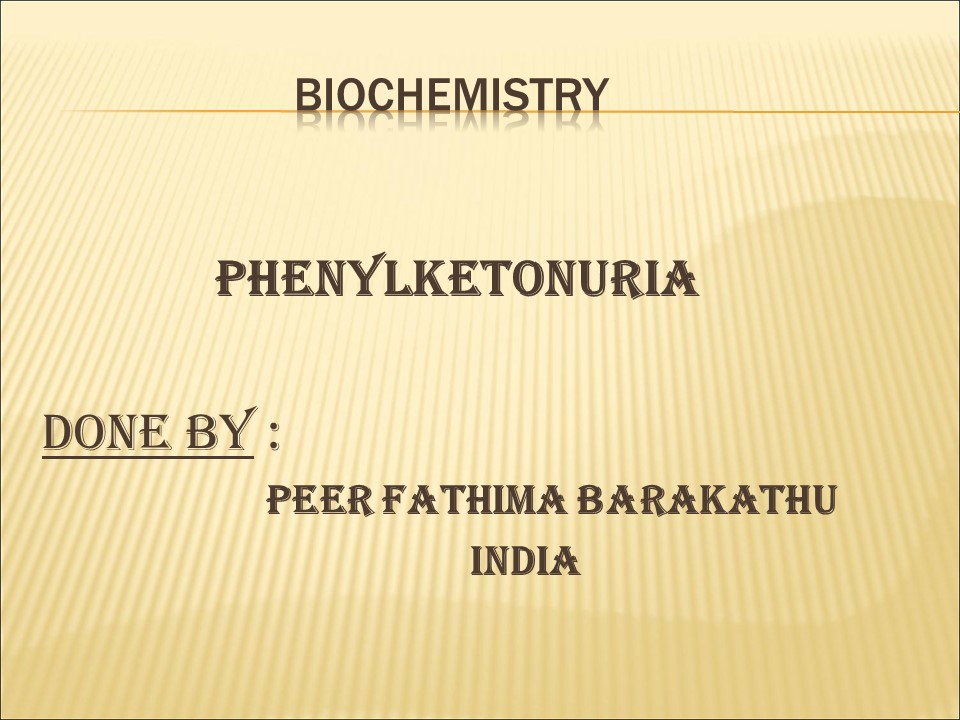kimia - PowerPoint PPT Presentation
Title:
kimia
Description:
kimia bio – PowerPoint PPT presentation
Number of Views:1
Title: kimia
1
BIOCHEMISTRY
- PHENYLKETONURIA
- DONE BY
- PEER FATHIMA BARAKATHU
- INDIA
2
Phenylketonuria (PKU)
- Phenylketonuria (PKU) is an autosomal
recessive metabolic genetic disorder characterized
by a mutation in the gene for the hepatic enzyme
phenylalanine hydroxylase (PAH), rendering it
nonfunctional. This enzyme is necessary to
metabolize the amino acid phenylalanine (Phe) to
the amino acid tyrosine. When PAH activity is
reduced, phenylalanine accumulates and is
converted into phenylpyruvate (also known as
phenylketone), which can be detected in the urine.
3
Phenylketonuria (PKU)
- The enzyme phenylalanine hydroxylase ( in the
presence of co-factor Tetrahydrobiopterin
BH4) normally converts the amino
acid phenylalanine into the amino acid tyrosine.
If this reaction does not take place,
phenylalanine accumulates and tyrosine is
deficient. Excessive phenylalanine can be
metabolized into phenylketones through the minor
route, a transaminase pathway with glutamate.
Metabolites include phenylacetate, phenylpyruvate
and phenethylamine. Elevated levels of
phenylalanine in the blood and detection of
phenylketones in the urine is diagnostic, however
most patients are diagnosed via newborn
screening.
4
Phenylketonuria (PKU)
- Phenylalanine is a large, neutral amino acid .
LNAAs compete for transport across
the bloodbrain barrier via the large neutral
amino acid transporter . If phenylalanine is in
excess in the blood, it will saturate the
transporter. Excessive levels of phenylalanine
tend to decrease the levels of other LNAAs in the
brain. However, as these amino acids are
necessary for protein and neurotransmitter
synthesis, Phe buildup hinders the development of
the brain, causing intellectual disability.
5
- The normal metabolism of phenylalanine
- (pathways a and b)
BREAKDOWN
Dietry sources, particularly plant proteins
PHENYLALANINE HYDROXYLASE
PHENYLALANINE
TYROSINE
BODY PROTEINS
2008 Paul Billiet ODWS
6
- The abnormal metabolism in phenylketonuric
subjects - (pathway c)
HYDROXYPHENYLACETIC ACID
PHENYLACETIC ACID
Agents, thought to be responsible for mental
retardation
2008 Paul Billiet ODWS
7
LEVELS OF BLOOD PHENYLALANINE
- A normal blood phenylalanine level is about
1mg/dl. - In cases of PKU, levels may range from 6-80mg/dl,
but are usually greater than 30mg/dl.
8
SYMPTOMS
- Chronically, high levels of phenylalanine and
some of its breakdown products can cause
significant brain problems. - There are other disorders of hyperphenylalaninemi
a, but classic PKU is the most common cause of
high levels of phenylalanine in the blood.
9
SYMPTOMS
- Phenylalanine accumulates, causing rashes,
seizures, hyperactivity, and mental retardation,
if untreated. - Prominent cheek and jaw bones widely spaced teeth
- Poor development of tooth enamel.
10
SYMPTOMS
- It is important to remember that some
phenylalanine is needed to maintain normal body
function. - Insufficient phenylalanine intake may cause
mental and physical sluggishness, loss of
appetite, anemia, rashes, and diarrhea.
11
SYMPTOMS
12
SYMPTOMS
13
HEREDITY
- A single mutant recessive allele of the
Phenylalanine Hydroxylase (PAH) gene Location
Long arm of Chromosome 12 -locus 22. - PAH only allow a tolerance of 20 mg/kg/day.
- Missense mutations and deletions.
- Dietary excess of plant proteins which results
in the exhaustion of a protein cofactor
Tetrahydrobiopterin BH4 needed by the enzyme.
14
HEREDITY
- Two people who conceive a child must both be the
carriers of the defective gene in order for their
child to have the disorder. - The carrier for PKU does not have the symptoms.
15
HEREDITY
16
PREGNANCY (PKU)
- It is recommended that women with PKU who are of
child bearing age, closely adhere to the
low-phenylalanine levels before conception and
throughout pregnancy. The risk of miscarriage,
mental retardation, microcephaly, and congenital
heart disease in the child is high if the
mothers blood phenylalanine is poorly controlled.
17
INCIDENCE OF PKU
- The mean incidence of PKU varies widely in
different human populations. - The PKU disorder is as frequent in men as it is
in women.
18
INCIDENCE OF PKU
19
INCIDENCE OF PKU
- Country Incidence of PKU
- India 1 in 18,300
- China 1 in 18,000
- Finland 1 in 100,000
- Ireland 1 in 4,500
- Japan 1 in 120,000
- Korea 1 in 41,000
- Norway 1 in 13,000
- Turkey 1 in 2,600
- United States1 in 15,000
20
SCREENING TEST
- Usually a few drops of blood are obtained by a
small prick on the heel, placed on a card and
then sent for measurement. - Newborn screening allows early identification and
early implementation of treatment.
21
SCREENING TEST
- All babies are screened for PKU by heel-prick
test. - Blood tested for excess phenylalanine.
- Blood placed on agar plate with bacteria that
need phenylalanine to grow. - Healthy babies blood doesnt have extra
phenylalanine, so bacteria cant grow. - Babies with PKU have extra
- phenylalanine, so bacteria grow.
22
Guthrie test for PKU
- Bacterial plate with newborn blood samples
http//www.childrenshospital.org/cfapps/research/d
ata_admin/Site2940/mainpageS2940P4sublevel15.html
23
SCREENING TEST
- Ferric chloride urine of new born baby? Green
colour in the presence of ketone bodies.
24
TREATMENT
- No cure.
- A strictly controlled phenylalanine free diet
- up to the age of about 14 years old.
- Phenylalanine is itself an essential amino acid
small doses must be supplied. - After 14 years, the growth and development of the
brain is not affected by high levels of
phenylalanine in the body.
25
TREATMENT
- Individuals with PKU must be alert for food
sweetened with aspartame - artificial sweetener
made from amino acids phenylalanine and aspartic
acid. - If PKU goes untreated or undetected, severe brain
problems occur such as seizures and mental
retardation.
26
TREATMENT
- More frequent doctor visits.
- Required dietary restrictions that may impact day
to day activities. - Permanent monitoring of blood phenylalanine
levels.
27
- THANK YOU !!!































